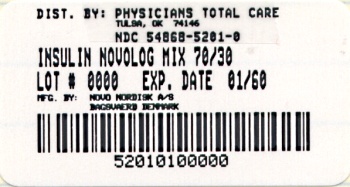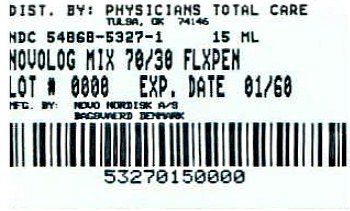Label: NOVOLOG MIX 70/30- insulin aspart injection, suspension
-
Contains inactivated NDC Code(s)
NDC Code(s): 54868-5201-0, 54868-5327-1 - Packager: Physicians Total Care, Inc.
- This is a repackaged label.
- Source NDC Code(s): 0169-3685, 0169-3696
- Category: HUMAN PRESCRIPTION DRUG LABEL
- DEA Schedule: None
- Marketing Status: New Drug Application
Drug Label Information
Updated November 8, 2010
If you are a consumer or patient please visit this version.
- Download DRUG LABEL INFO: PDF XML
- Official Label (Printer Friendly)
-
HIGHLIGHTS OF PRESCRIBING INFORMATION
These highlights do not include all the information needed to use NovoLog Mix 70/30 safely and effectively. See full prescribing information for NovoLog Mix 70/30. NovoLog® Mix 70/30 (70% insulin aspart protamine suspension and 30% insulin aspart injection, [rDNA origin]) Suspension for subcutaneous injection Initial U.S. Approval: 2001
INDICATIONS AND USAGE
NovoLog Mix 70/30 is an insulin analog indicated to improve glycemic control in patients with diabetes mellitus.
Important Limitations of Use: In premix insulins, such as Novolog Mix 70/30, the proportions of rapid acting and long acting insulins are fixed and do not allow for basal versus prandial dose adjustments (1).
DOSAGE AND ADMINISTRATION
DOSAGE FORMS AND STRENGTHS
Each presentation contains 100 Units of insulin aspart per mL (U-100) (3)
- 10 mL vials
- 3 mL NovoLog Mix 70/30 FlexPen
CONTRAINDICATIONS
WARNINGS AND PRECAUTIONS
- NovoLog Mix 70/30 should not be mixed with any other insulin product (5.1).
- Hypoglycemia is the most common adverse effect of insulin therapy. Glucose monitoring is recommended for all patients with diabetes. Any change of insulin dose should be made cautiously and only under medical supervision (5.1,5.2).
- Insulin, particularly when given in settings of poor glycemic control, can cause hypokalemia. Use caution in patients predisposed to hypokalemia (5.3).
- Like all insulins, NovoLog Mix 70/30 requirements may be reduced in patients with renal impairment or hepatic impairment (5.4, 5.5).
- Severe, life-threatening, generalized allergy, including anaphylaxis, may occur with insulin products, including NovoLog Mix 70/30 (5.6).
ADVERSE REACTIONS
Adverse reactions observed with insulin therapy include hypoglycemia, allergic reactions, local injection site reactions, lipodystrophy, rash and pruritus (6).
To report SUSPECTED ADVERSE REACTIONS, contact Novo Nordisk Inc. at 1-800-727-6500 or FDA at 1-800-FDA-1088 or www.fda.gov/medwatch
DRUG INTERACTIONS
- The following may increase the blood glucose lowering effect and susceptibility to hypoglycemia: oral antidiabetic products, pramlintide, ACE inhibitors, disopyramide, fibrates, fluoxetine, monoamine oxidase (MAO) inhibitors, propoxyphene, salicylates, somatostatin analog (e.g. octreotide), sulfonamide antibiotics (7).
- The following may reduce the blood-glucose-lowering effect: corticosteroids, niacin, danazol, diuretics, sympathomimetic agents (e.g., epinephrine, salbutamol, terbutaline), isoniazid, phenothiazine derivatives, somatropin, thyroid hormones, estrogens, progestogens (e.g., in oral contraceptives), atypical antipsychotics (7).
- Beta-blockers, clonidine, lithium salts, and alcohol may either potentiate or weaken the blood-glucose-lowering effect of insulin (7).
- Pentamidine may cause hypoglycemia, which may be followed by hyperglycemia (7).
- The signs of hypoglycemia may be reduced or absent in patients taking sympatholytic products such as beta-blockers, clonidine, guanethidine, and reserpine (7).
See 17 for PATIENT COUNSELING INFORMATION and FDA-approved patient labeling.
Revised: 6/2011
-
Table of Contents
FULL PRESCRIBING INFORMATION: CONTENTS*
1 INDICATIONS AND USAGE
2 DOSAGE AND ADMINISTRATION
2.1 Dosing
2.2 Resuspension
3 DOSAGE FORMS AND STRENGTHS
4 CONTRAINDICATIONS
5 WARNINGS AND PRECAUTIONS
5.1 Administration
5.2 Hypoglycemia
5.3 Hypokalemia
5.4 Renal Impairment
5.5 Hepatic Impairment
5.6 Hypersensitivity and Allergic Reactions
5.7 Antibody Production
6 ADVERSE REACTIONS
7 DRUG INTERACTIONS
8 USE IN SPECIFIC POPULATIONS
8.1 Pregnancy
8.2 Nursing Mothers
8.4 Pediatric Use
8.5 Geriatric Use
10 OVERDOSAGE
11 DESCRIPTION
12 CLINICAL PHARMACOLOGY
12.1 Mechanism of Action
12.2 Pharmacodynamics
12.3 Pharmacokinetics
13 NONCLINICAL TOXICOLOGY
13.1 Carcinogenesis, Mutagenesis, Impairment of Fertility
13.2 Animal Toxicology and/or Pharmacology
14 CLINICAL STUDIES
14.1 NovoLog Mix 70/30 versus Novolin 70/30
14.2 Combination Therapy: Insulin and Oral Agents in Patients with Type 2 Diabetes
15 REFERENCES
16 HOW SUPPLIED/STORAGE AND HANDLING
16.1 How Supplied
16.2 Recommended Storage
17 PATIENT COUNSELING INFORMATION
17.1 Physicians Instructions
- *
- Sections or subsections omitted from the full prescribing information are not listed.
-
1 INDICATIONS AND USAGE
NovoLog Mix 70/30 is an insulin analog indicated to improve glycemic control in patients with diabetes mellitus.
Important Limitations of Use:
In premix insulins, such as Novolog Mix 70/30, the proportions of rapid acting and long acting insulins are fixed and do not allow for basal versus prandial dose adjustments.
-
2 DOSAGE AND ADMINISTRATION
Enter section text here
2.1 Dosing
NovoLog Mix 70/30 is an insulin analog with an earlier onset and intermediate duration of action in comparison to the basal human insulin premix. The addition of protamine to the rapid-acting aspart insulin analog (NovoLog) results in insulin activity that is 30% short-acting and 70% long-acting. NovoLog Mix 70/30 is typically dosed on a twice-daily basis (with each dose intended to cover 2 meals or a meal and a snack). The dosage of NovoLog Mix 70/30 must be individualized. The written prescription for NovoLog Mix 70/30 should include the full name, to avoid confusion with NovoLog (insulin aspart) and Novolin 70/30 (human premix).
NovoLog Mix 70/30 should appear uniformly white and cloudy. Do not use it if it looks clear or if it contains solid particles. NovoLog Mix 70/30 should not be used after the printed expiration date.
NovoLog Mix 70/30 should be administered by subcutaneous injection in the abdominal region, buttocks, thigh, or upper arm. NovoLog Mix 70/30 has a faster onset of action than human insulin premix 70/30 and should be dosed within 15 minutes before meal initiation for patients with type 1 diabetes. For patients with type 2 diabetes, dosing should occur within 15 minutes before or after meal initiation. Injection sites should be rotated within the same region to reduce the risk of lipodystrophy. As with all insulins, the duration of action may vary according to the dose, injection site, blood flow, temperature, and level of physical activity.
NovoLog Mix 70/30 should not be administered intravenously or used in insulin infusion pumps. Dose regimens of NovoLog Mix 70/30 will vary among patients and should be determined by the health care professional familiar with the patient’s recommended glucose treatment goals, metabolic needs, eating habits, and other lifestyle variables.
2.2 Resuspension
NovoLog Mix 70/30 is a suspension that must be visually inspected and resuspended immediately before use. The NovoLog Mix 70/30 vial should be rolled gently in your hands in a horizontal position 10 times to mix it. The rolling procedure must be repeated until the suspension appears uniformly white and cloudy. Inject immediately. Resuspension is easier when the insulin has reached room temperature.
The NovoLog Mix 70/30 FlexPen should be rolled 10 times gently between your hands in a horizontal position. Thereafter, turn the NovoLog Mix 70/30 FlexPen upside down so that the glass ball moves from one end of the reservoir to the other. Do this at least 10 times. The rolling and turning procedure must be repeated until the suspension appears uniformly white and cloudy. Inject immediately. Before each subsequent injection, turn the disposable NovoLog Mix 70/30 FlexPen upside down so that the glass ball moves from one end of the reservoir to the other at least 10 times and until the suspension appears uniformly white and cloudy. Inject immediately.
- 3 DOSAGE FORMS AND STRENGTHS
- 4 CONTRAINDICATIONS
-
5 WARNINGS AND PRECAUTIONS
Enter section text here
5.1 Administration
The short and long-acting components of insulin mixes, including NovoLog Mix 70/30, cannot be titrated independently. Because NovoLog Mix 70/30 has peak pharmacodynamic activity between 1-4 hours after injection, it should be administered within 15 minutes of meal initiation [see Clinical Pharmacology (12)]. The dose of insulin required to provide adequate glycemic control for one of the meals may result in hyper- or hypoglycemia for the other meal. The pharmacodynamic profile may also be inadequate for patients who require more frequent meals.
NovoLog Mix 70/30 should not be mixed with any other insulin product.
NovoLog Mix 70/30 should not be used intravenously.
NovoLog Mix 70/30 should not be used in insulin infusion pumps.
Glucose monitoring is recommended for all patients with diabetes. Any change of insulin dose should be made cautiously and only under medical supervision. Changing from one insulin product to another or changing the insulin strength may result in the need for a change in dosage. Changes may also be necessary during illness, emotional stress, and other physiologic stress in addition to changes in meals and exercise.
The pharmacokinetic and pharmacodynamic profiles of all insulins may be altered by the site used for injection and the degree of vascularization of the site. Smoking, temperature, and exercise contribute to variations in blood flow and insulin absorption. These and other factors contribute to inter- and intra-patient variability.
Needles and NovoLog Mix 70/30 FlexPen must not be shared.
5.2 Hypoglycemia
Hypoglycemia is the most common adverse effect of insulin therapy, including NovoLog Mix 70/30. Severe hypoglycemia may lead to unconsciousness and/or convulsions and may result in temporary or permanent impairment of brain function or even death. Severe hypoglycemia requiring the assistance of another person and/or parenteral glucose infusion or glucagon administration has been observed in clinical trials with insulin, including trials with NovoLog Mix 70/30.
The timing of hypoglycemia may reflect the time-action profile of the insulin formulation [see Clinical Pharmacology (12)]. Other factors, such as changes in dietary intake (e.g., amount of food or timing of meals), injection site, exercise, and concomitant medications may also alter the risk of hypoglycemia [see Drug Interactions (7)]. As with all insulins, use caution in patients with hypoglycemia unawareness and in patients who may be predisposed to hypoglycemia (e.g. patients who are fasting or have erratic food intake). The patient’s ability to concentrate and react may be impaired as a result of hypoglycemia. This may present a risk in situations where these abilities are especially important, such as driving or operating machinery.
Rapid changes in serum glucose levels may induce symptoms of hypoglycemia in persons with diabetes, regardless of the glucose value. Early warning symptoms of hypoglycemia may be different or less pronounced under certain conditions, such as long duration of diabetes, diabetic nerve disease, use of medications such as beta-blockers, or intensified diabetes control [see Drug Interactions (7)].
5.3 Hypokalemia
All insulin products, including NovoLog Mix 70/30, cause a shift in potassium from the extracellular to intracellular space, possibly leading to hypokalemia that, if left untreated, may cause respiratory paralysis, ventricular arrhythmia, and death. Use caution in patients who may be at risk for hypokalemia (e.g. patients using potassium-lowering medications or patients taking medications sensitive to potassium concentrations).
5.4 Renal Impairment
Clinical or pharmacology studies with NovoLog Mix 70/30 in diabetic patients with various degrees of renal impairment have not been conducted. As with other insulins, the requirements for NovoLog Mix 70/30 may be reduced in patients with renal impairment [see Clinical Pharmacology (12.3)].
5.5 Hepatic Impairment
Clinical or pharmacology studies with NovoLog Mix 70/30 in diabetic patients with various degrees of hepatic impairment have not been conducted. As with other insulins, the requirements for NovoLog Mix 70/30 may be reduced in patients with hepatic impairment [see Clinical Pharmacology (12.3)].
5.6 Hypersensitivity and Allergic Reactions
Local Reactions- As with other insulin therapy, patients may experience reactions such as erythema, edema or pruritus at the site of NovoLog Mix 70/30 injection. These reactions usually resolve in a few days to a few weeks, but in some occasions, may require discontinuation of NovoLog Mix 70/30. In some instances, these reactions may be related to the insulin molecule, other components in the insulin preparation including protamine and cresol, components in skin cleansing agents, or injection techniques. Localized reactions and generalized myalgias have been reported with the use of cresol as an injectable excipient.
Systemic Reactions- Less common, but potentially more serious, is generalized allergy to insulin, which may cause rash (including pruritus) over the whole body, shortness of breath, wheezing, reduction in blood pressure, rapid pulse, or sweating. Severe cases of generalized allergy, including anaphylactic reaction, may be life threatening.
5.7 Antibody Production
Specific anti-insulin antibodies as well as cross-reacting anti-insulin antibodies were monitored in a 3-month, open-label comparator trial as well as in a long-term extension trial. Changes in cross-reactive antibodies were more common after NovoLog Mix 70/30 than with Novolin 70/30 but these changes did not correlate with change in HbA1c or increase in insulin dose. The clinical significance of these antibodies has not been established. Antibodies did not increase further after long-term exposure (>6 months) to NovoLog Mix 70/30.
-
6 ADVERSE REACTIONS
Clinical Trial Experience
Clinical trials are conducted under widely varying designs, therefore, the adverse reaction rates reported in one clinical trial may not be easily compared to those rates reported in another clinical trial, and may not reflect the rates actually observed in clinical practice.
- Hypoglycemia
Hypoglycemia is the most commonly observed adverse reaction in patients using insulin, including NovoLog Mix 70/30 [see Warnings and Precautions (5.2)]. NovoLog Mix 70/30 should not be used during episodes of hypoglycemia [see Contraindications (4)] and [Warnings and Precautions (5)].
- Insulin initiation and glucose control intensification
Intensification or rapid improvement in glucose control has been associated with transitory, reversible ophthalmologic refraction disorder, worsening of diabetic retinopathy, and acute painful peripheral neuropathy. However, long-term glycemic control decreases the risk of diabetic retinopathy and neuropathy.
- Lipodystrophy
Long-term use of insulin, including NovoLog Mix 70/30, can cause lipodystrophy at the site of repeated insulin injections. Lipodystrophy includes lipohypertrophy (thickening of adipose tissue) and lipoatrophy (thinning of adipose tissue), and may affect insulin absorption. Rotate insulin injection sites within the same region to reduce the risk of lipodystrophy.
- Weight gain
Weight gain can occur with some insulin therapies, including NovoLog Mix 70/30, and has been attributed to the anabolic effects of insulin and the decrease in glycosuria.
- Peripheral Edema
Insulin may cause sodium retention and edema, particularly if previously poor metabolic control is improved by intensified insulin therapy.
- Frequencies of adverse drug reactions
The frequencies of adverse drug reactions during a clinical trial with NovoLog Mix 70/30 in patients with type 1 diabetes mellitus and type 2 diabetes mellitus are listed in the tables below. The trial was a three-month, open-label trial in patients with Type 1 or Type 2 diabetes who were treated twice daily (before breakfast and before supper) with NovoLog Mix 70/30.
Table 1: Treatment-Emergent Adverse Events in Patients with Type 1 diabetes mellitus (Adverse events with frequency ≥ 5% are included.)
NovoLog Mix 70/30
(N=55)Novolin 70/30
(N=49)Preferred Term N % N % Hypoglycemia 38 69 37 76 Headache 19 35 6 12 Influenza-like symptoms 7 13 1 2 Dyspepsia 5 9 3 6 Back pain 4 7 2 4 Diarrhea 4 7 3 6 Pharyngitis 4 7 1 2 Rhinitis 3 5 6 12 Skeletal pain 3 5 2 4 Upper respiratory tract infection 3 5 1 2 Table 2: Treatment-Emergent Adverse Events in Patients with Type 2 diabetes mellitus (Adverse events with frequency ≥ 5% are included.)
NovoLog Mix 70/30
(N=85)Novolin 70/30
(N=102)Preferred Term N % N % Hypoglycemia 40 47 51 50 Upper respiratory tract infection 10 12 6 6 Headache 8 9 8 8 Diarrhea 7 8 2 2 Neuropathy 7 8 2 2 Pharyngitis 5 6 4 4 Abdominal pain 4 5 0 0 Rhinitis 4 5 2 2 Postmarketing Data
Additional adverse reactions have been identified during post-approval use of NovoLog Mix 70/30. Because these adverse reactions are reported voluntarily from a population of uncertain size, it is generally not possible to reliably estimate their frequency. They include medication errors in which other insulins have been accidentally substituted for NovoLog Mix 70/30 [see Patient Counseling Information (17)].
-
7 DRUG INTERACTIONS
A number of substances affect glucose metabolism and may require insulin dose adjustment and particularly close monitoring.
- The following are examples of substances that may increase the blood-glucose-lowering effect and susceptibility to hypoglycemia: oral antidiabetic products, pramlintide, ACE inhibitors, disopyramide, fibrates, fluoxetine, monoamine oxidase (MAO) inhibitors, propoxyphene, salicylates, somatostatin analog (e.g. octreotide), sulfonamide antibiotics.
- The following are examples of substances that may reduce the blood-glucose-lowering effect: corticosteroids, niacin, danazol, diuretics, sympathomimetic agents (e.g., epinephrine, salbutamol, terbutaline), isoniazid, phenothiazine derivatives, somatropin, thyroid hormones, estrogens, progestogens (e.g., in oral contraceptives), atypical antipsychotics.
- Beta-blockers, clonidine, lithium salts, and alcohol may either potentiate or weaken the blood-glucose-lowering effect of insulin.
- Pentamidine may cause hypoglycemia, which may sometimes be followed by hyperglycemia.
- The signs of hypoglycemia may be reduced or absent in patients taking sympatholytic products such as beta-blockers, clonidine, guanethidine, and reserpine.
-
8 USE IN SPECIFIC POPULATIONS
Enter section text here
8.1 Pregnancy
Pregnancy Category B.
All pregnancies have a background risk of birth defects, loss, or other adverse outcome regardless of drug exposure. This background risk is increased in pregnancies complicated by hyperglycemia and may be decreased with good metabolic control. It is essential for patients with diabetes or history of gestational diabetes to maintain good metabolic control before conception and throughout pregnancy. Insulin requirements may decrease during the first trimester, generally increase during the second and third trimesters, and rapidly decline after delivery. Careful monitoring of glucose control is essential in such patients.
An open-label, randomized study compared the safety and efficacy of NovoLog (the rapid-acting component of NovoLog Mix 70/30) versus human insulin in the treatment of pregnant women with Type 1 diabetes (322 exposed pregnancies (NovoLog: 157, human insulin: 165)). Two-thirds of the enrolled patients were already pregnant when they entered the study. Since only one-third of the patients enrolled before conception, the study was not large enough to evaluate the risk of congenital malformations. Mean HbA1c of ~ 6% was observed in both groups during pregnancy, and there was no significant difference in the incidence of maternal hypoglycemia.
Animal reproduction studies have not been conducted with NovoLog Mix 70/30. However, subcutaneous reproduction and teratology studies have been performed with NovoLog (the rapid-acting component of NovoLog Mix 70/30) and regular human insulin in rats and rabbits. In these studies, NovoLog was given to female rats before mating, during mating, and throughout pregnancy, and to rabbits during organogenesis. The effects of NovoLog did not differ from those observed with subcutaneous regular human insulin.
NovoLog, like human insulin, caused pre- and post-implantation losses and visceral/skeletal abnormalities in rats at a dose of 200 U/kg/day (approximately 32-times the human subcutaneous dose of 1.0 U/kg/day, based on U/body surface area), and in rabbits at a dose of 10 U/kg/day (approximately three times the human subcutaneous dose of 1.0 U/kg/day, based on U/body surface area). The effects are probably secondary to maternal hypoglycemia at high doses. No significant effects were observed in rats at a dose of 50 U/kg/day and rabbits at a dose of 3 U/kg/day. These doses are approximately 8 times the human subcutaneous dose of 1.0 U/kg/day for rats and equal to the human subcutaneous dose of 1.0 U/kg/day for rabbits based on U/body surface area.
Female patients should be advised to discuss with their physician if they intend to, or if they become pregnant. There are no adequate and well-controlled studies of the use of NovoLog Mix 70/30 in pregnant women.
8.2 Nursing Mothers
It is unknown whether insulin aspart is excreted in human milk as occurs with human insulin. There are no adequate and well-controlled studies of the use of NovoLog Mix 70/30 or NovoLog in lactating women. Women with diabetes who are lactating may require adjustments of their insulin doses.
8.4 Pediatric Use
Safety and effectiveness of NovoLog Mix 70/30 have not been established in pediatric patients.
8.5 Geriatric Use
Clinical studies of NovoLog Mix 70/30 did not include sufficient numbers of patients aged 65 and over to determine whether they respond differently than younger patients. In general, dose selection for an elderly patient should be cautious, usually starting at the low end of the dosing range reflecting the greater frequency of decreased hepatic, renal, or cardiac function, and of concomitant disease or other drug therapy in this population.
-
10 OVERDOSAGE
Hypoglycemia may occur as a result of an excess of insulin relative to food intake, energy expenditure, or both. Mild episodes of hypoglycemia usually can be treated with oral glucose. Adjustments in drug dosage, meal patterns, or exercise, may be needed. More severe episodes with coma, seizure, or neurologic impairment may be treated with intramuscular/subcutaneous glucagon or concentrated intravenous glucose. Sustained carbohydrate intake and observation may be necessary because hypoglycemia may recur after apparent clinical recovery.
-
11 DESCRIPTION
NovoLog Mix 70/30 (70% insulin aspart protamine suspension and 30% insulin aspart injection, [rDNA origin]) is a human insulin analog suspension containing 70% insulin aspart protamine crystals and 30% soluble insulin aspart. NovoLog Mix 70/30 is a blood glucose-lowering agent with an earlier onset and an intermediate duration of action. Insulin aspart is homologous with regular human insulin with the exception of a single substitution of the amino acid proline by aspartic acid in position B28, and is produced by recombinant DNA technology utilizing Saccharomyces cerevisiae (baker’s yeast). Insulin aspart (NovoLog) has the empirical formula C256H381N65O79S6 and a molecular weight of 5825.8 Da.
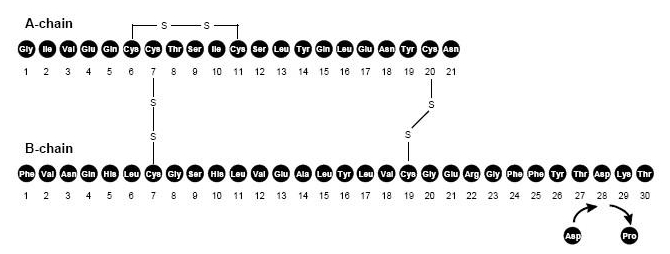
Figure 1. Structural formula of insulin aspart
NovoLog Mix 70/30 is a uniform, white, sterile suspension that contains insulin aspart 100 Units/mL.
Inactive ingredients for the 10 mL vial are mannitol 36.4 mg/mL, phenol 1.50 mg/mL, metacresol 1.72 mg/mL, zinc 19.6 μg/mL, disodium hydrogen phosphate dihydrate 1.25 mg/mL, sodium chloride 0.58 mg/mL, and protamine sulfate 0.32 mg/mL.
Inactive ingredients for the NovoLog Mix 70/30 FlexPen are glycerol 16.0 mg/mL, phenol 1.50 mg/mL, metacresol 1.72 mg/mL, zinc 19.6 μg/mL, disodium hydrogen phosphate dihydrate 1.25 mg/mL, sodium chloride 0.877 mg/mL, and protamine sulfate 0.32 mg/mL. NovoLog Mix 70/30 has a pH of 7.20 - 7.44. Hydrochloric acid or sodium hydroxide may be added to adjust pH.
-
12 CLINICAL PHARMACOLOGY
Enter section text here
12.1 Mechanism of Action
The primary activity of NovoLog Mix 70/30 is the regulation of glucose metabolism. Insulins, including NovoLog Mix 70/30, bind to the insulin receptors on muscle, liver and fat cells and lower blood glucose by facilitating the cellular uptake of glucose and simultaneously inhibiting the output of glucose from the liver.
12.2 Pharmacodynamics
The two euglycemic clamp studies described below [see Clinical Pharmacology (12.3)] assessed glucose utilization after dosing of healthy volunteers. NovoLog Mix 70/30 has an earlier onset of action than human premix 70/30 in studies of normal volunteers and patients with diabetes. The onset of action is between 10-20 minutes for NovoLog Mix 70/30 compared to 30 minutes for Novolin 70/30. The mean ± SD time to peak activity for NovoLog Mix 70/30 is 2.4 hr ± 0.8hr compared to 4.2 hr ± 0.4 hr for Novolin 70/30. The duration of action may be as long as 24 hours (see Figure 2).
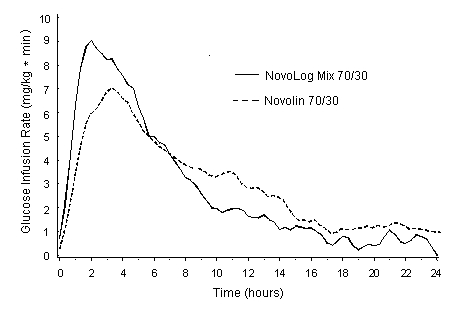
Figure 2. Pharmacodynamic Activity Profile of NovoLog Mix 70/30 and Novolin 70/30 in healthy subjects.
12.3 Pharmacokinetics
The single substitution of the amino acid proline with aspartic acid at position B28 in insulin aspart (NovoLog) reduces the molecule’s tendency to form hexamers as observed with regular human insulin. The rapid absorption characteristics of NovoLog are maintained by NovoLog Mix 70/30. The insulin aspart in the soluble component of NovoLog Mix 70/30 is absorbed more rapidly from the subcutaneous layer than regular human insulin. The remaining 70% is in crystalline form as insulin aspart protamine which has a prolonged absorption profile after subcutaneous injection.
Bioavailability and Absorption- The relative bioavailability of NovoLog Mix 70/30 compared to NovoLog and Novolin 70/30 indicates that the insulins are absorbed to similar extent. In euglycemic clamp studies in healthy volunteers (n=23) after dosing with NovoLog Mix 70/30 (0.2 U/kg), a mean maximum serum concentration (Cmax) of 23.4 ± 5.3 mU/L was reached after 60 minutes. The mean half-life (t1/2) of NovoLog Mix 70/30 was about 8 to 9 hours. Serum insulin levels returned to baseline 15 to 18 hours after a subcutaneous dose of NovoLog Mix 70/30. Similar data were seen in a separate euglycemic clamp study in healthy volunteers (n=24) after dosing with NovoLog Mix 70/30 (0.3 U/kg). A Cmax of 61.3 ± 20.1 mU/L was reached after 85 minutes. Serum insulin levels returned to baseline 12 hours after a subcutaneous dose.
The Cmax and the area under the insulin concentration-time curve (AUC) after administration of NovoLog Mix 70/30 was approximately 20% greater than those after administration of Novolin 70/30, (see Fig. 3 for pharmacokinetic profiles).
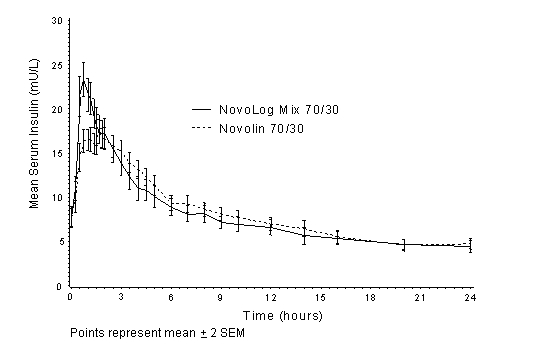
Figure 3. Pharmacokinetic Profiles of NovoLog Mix 70/30 and Novolin 70/30
Distribution and Elimination- NovoLog has a low binding to plasma proteins, 0 to 9%, similar to regular human insulin. After subcutaneous administration in normal male volunteers (n=24), NovoLog was more rapidly eliminated than regular human insulin with an average apparent half-life of 81 minutes compared to 141 minutes for regular human insulin.
The effect of sex, age, obesity, ethnic origin, renal and hepatic impairment, pregnancy, or smoking, on the pharmacodynamics and pharmacokinetics of NovoLog Mix 70/30 has not been studied.
-
13 NONCLINICAL TOXICOLOGY
Enter section text here
13.1 Carcinogenesis, Mutagenesis, Impairment of Fertility
Standard 2-year carcinogenicity studies in animals have not been performed to evaluate the carcinogenic potential of NovoLog Mix 70/30. In 52-week studies, Sprague-Dawley rats were dosed subcutaneously with NovoLog, the rapid-acting component of NovoLog Mix 70/30, at 10, 50, and 200 U/kg/day (approximately 2, 8, and 32 times the human subcutaneous dose of 1.0 U/kg/day, based on U/body surface area, respectively). At a dose of 200 U/kg/day, NovoLog increased the incidence of mammary gland tumors in females when compared to untreated controls. The incidence of mammary tumors found with NovoLog was not significantly different from that found with regular human insulin. The relevance of these findings to humans is not known.
NovoLog was not genotoxic in the following tests: Ames test, mouse lymphoma cell forward gene mutation test, human peripheral blood lymphocyte chromosome aberration test, in vivo micronucleus test in mice, and in ex vivo UDS test in rat liver hepatocytes.
In fertility studies in male and female rats, NovoLog at subcutaneous doses up to 200 U/kg/day (approximately 32 times the human subcutaneous dose, based on U/body surface area) had no direct adverse effects on male and female fertility, or on general reproductive performance of animals.
13.2 Animal Toxicology and/or Pharmacology
In standard biological assays in mice and rabbits, one unit of NovoLog has the same glucose-lowering effect as one unit of regular human insulin. However, the effect of NovoLog Mix 70/30 is more rapid in onset compared to Novolin (human insulin) 70/30 due to its faster absorption after subcutaneous injection.
-
14 CLINICAL STUDIES
Enter section text here
14.1 NovoLog Mix 70/30 versus Novolin 70/30
In a three-month, open-label trial, patients with Type 1 (n=104) or Type 2 (n=187) diabetes were treated twice daily (before breakfast and before supper) with NovoLog Mix 70/30 or Novolin 70/30. Patients had received insulin for at least 24 months before the study. Oral hypoglycemic agents were not allowed within 1 month prior to the study or during the study. The small changes in HbA1c were comparable across the treatment groups (see Table 3).
Table 3: Glycemic Parameters at the End of Treatment [Mean ± SD (N subjects)]
NovoLog Mix 70/30 Novolin 70/30 Type 1, N=104
Fasting Blood Glucose (mg/dL) 174 ± 64 (48) 142 ± 59 (44) 1.5 Hour Post Breakfast (mg/dL) 187 ± 82 (48) 200 ± 82 (42) 1.5 Hour Post Dinner (mg/dL) 162 ± 77 (47) 171 ± 66 (41) HbA1c (%) Baseline 8.4 ± 1.2 (51) 8.5 ± 1.1 (46) HbA1c (%) Week 12 8.4 ± 1.1 (51) 8.3 ± 1.0 (47) Type 2, N=187
Fasting Blood Glucose (mg/dL) 153 ± 40 (76) 152 ± 69 (93) 1.5 Hour Post Breakfast (mg/dL) 182 ± 65 (75) 200 ± 80 (92) 1.5 Hour Post Dinner (mg/dL) 168 ± 51 (75) 191 ± 65 (93) HbA1c (%) Baseline 8.1 ± 1.2 (82) 8.2 ± 1.3 (98) HbA1c (%) Week 12 7.9 ± 1.0 (81) 8.1 ± 1.1 (96) The significance, with respect to the long-term clinical sequelae of diabetes, of the differences in postprandial hyperglycemia between treatment groups has not been established.
Specific anti-insulin antibodies as well as cross-reacting anti-insulin antibodies were monitored in the 3-month, open-label comparator trial as well as in a long-term extension trial.
14.2 Combination Therapy: Insulin and Oral Agents in Patients with Type 2 Diabetes
Trial 1:
In a 34-week, open-label trial, insulin-naïve patients with type 2 diabetes currently treated with 2 oral antidiabetic agents were switched to treatment with metformin and pioglitazone. During an 8-week optimization period metformin and pioglitazone were increased to 2500 mg per day and 30 or 45 mg per day, respectively. After the optimization period, subjects were randomized to receive either NovoLog Mix 70/30 twice daily added on to the metformin and pioglitazone regimen or continue the current optimized metformin and pioglitazone therapy. NovoLog Mix 70/30 was started at a dose of 6 IU twice daily (before breakfast and before supper). Insulin doses were titrated to a pre-meal glucose goal of 80-110 mg/dL. The total daily insulin dose at the end of the study was 56.9 ± 30.5 IU.
Table 4: Combination Therapy with Oral Agents and Insulin in Patients with Type 2 Diabetes Mellitus [Mean (SD)] Treatment duration 24-weeks NovoLog Mix 70/30 + Metformin
+ PioglitazoneMetformin + Pioglitazone HbA1c
Baseline mean ± SD (n) 8.1 ± 1.0 (102) 8.1 ± 1.0 (98) End-of-study mean ± SD (n) - LOCF 6.6 ± 1.0 (93) 7.8 ± 1.2 (87) Adjusted Mean change from baseline ± SE (n)* -1.6 ± 0.1 (93) -0.3 ± 0.1 (87) Treatment difference mean ± SE* 95% CI* -1.3 ± 0.1
(-1.6, -1.0)
Percentage of subjects reaching HbA1c <7.0% 76% 24% Percentage of subjects reaching HbA1c<6.5% 59% 12% Fasting Blood Glucose (mg/dL)
Baseline Mean ± SD (n) 173 ± 39.8 (93) 163 ± 35.4 (88) End of Study Mean ± SD (n) - LOCF 130 ± 50.0 (90) 162 ± 40.8 (84) Adjusted Mean change from baseline ± SE (n)* -43.0 ± 5.3 (90) -3.9 ± 5.3 (84) End-of-Study Blood Glucose (Plasma) (mg/dL)
2 Hour Post Breakfast 138 ± 42.8 (86) 188 ± 57.7 (74) 2 Hour Post Lunch 150 ± 41.5 (86) 176 ± 56.5 (74) 2 Hour Post Dinner 141 ± 57.8 (86) 195 ± 60.1 (74) % of patients with severe hypoglycemia** 3 0 % of patients with minor hypoglycemia** 52 3 Weight gain at end of study (kg)** 4.6 ± 4.3 (92) 0.8 ± 3.2 (86) *Adjusted mean per group, treatment difference, and 95% CI were obtained based on an ANCOVA model with treatment, FPG stratum, and secretagogue stratum as fixed factors and baseline HbA1c as the covariate.
**If metabolic control is improved by intensified insulin therapy, an increased risk of hypoglycemia and weight gain may occur.
Trial 2:
In a 28-week, open-label trial, insulin-naïve patients with type 2 diabetes with fasting plasma glucose above 140 mg/dL currently treated with metformin ± thiazolidinedione therapy were randomized to receive either NovoLog Mix 70/30 twice daily [before breakfast and before supper] or insulin glargine once daily1 (see Table 5). NovoLog Mix 70/30 was started at an average dose of 5-6 IU (0.07 ± 0.03 IU/kg) twice daily (before breakfast and before supper), and bedtime insulin glargine was started at 10-12 IU (0.13 ± 0.03 IU/kg). Insulin doses were titrated weekly by decrements or increments of -2 to +6 units per injection to a pre-meal glucose goal of 80-110 mg/dL. The metformin dose was adjusted to 2550 mg/day. Approximately one-third of the patients in each group were also treated with pioglitazone (30 mg/day). Insulin secretagogues were discontinued in order to reduce the risk of hypoglycemia. Most patients were Caucasian (53%), and the mean initial weight was 90 kg.
Table 5: Combination Therapy with Oral Agents and Two Types of Insulin in Patients with Type 2 Diabetes Mellitus [Mean (SD)] Treatment duration 28-weeks NovoLog Mix 70/30 + Metformin ± Pioglitazone Insulin Glargine + Metformin ± Pioglitazone Number of patients 117 116 HbA1c
Baseline mean (%) 9.7 ± 1.5 (117) 9.8 ± 1.4 (114) End-of-study mean (± SD) 6.9 ± 1.2 (108) 7.4 ± 1.2 (114) Mean change from baseline -2.7 ± 1.6 (108) -2.4 ± 1.5 (114) Percentage of subjects reaching HbA1c <7.0% 66% 40% Total Daily Insulin Dose at end of study (U) 78 ± 40 (117) 51 ± 27 (116) % of patients with severe hypoglycemia 0 0 % of minor hypoglycemia 43 16 Weight gain at end of study 5.4 ± 4.8 (117) 3.5 ± 4.5 (116) - 15 REFERENCES
-
16 HOW SUPPLIED/STORAGE AND HANDLING
Enter section text here
16.1 How Supplied
NovoLog Mix 70/30 is available in the following package sizes: each presentation contains 100 Units of insulin aspart per mL (U-100).
10 mL vials NDC 54868-5201-0
3 mL NovoLog Mix 70/30 FlexPen
NDC 54868-5327-1
NovoLog Mix 70/30 vials and NovoLog Mix 70/30 FlexPen are latex free.
16.2 Recommended Storage
Unused NovoLog Mix 70/30 should be stored in a refrigerator between 2°C and 8°C (36°F to 46°F). Do not store in the freezer or directly adjacent to the refrigerator cooling element. Do not freeze NovoLog Mix 70/30 or use NovoLog Mix 70/30 if it has been frozen.
Vials: After initial use, a vial may be kept at temperatures below 30°C (86°F) for up to 28 days, but should not be exposed to excessive heat or sunlight. Open vials may be refrigerated.
Unpunctured vials can be used until the expiration date printed on the label if they are stored in a refrigerator. Keep unused vials in the carton so they will stay clean and protected from light.
NovoLog Mix 70/30 FlexPen: Once a NovoLog Mix 70/30 FlexPen is punctured, it should be kept at temperatures below 30°C (86°F) for up to 14 days, but should not be exposed to excessive heat or sunlight. A NovoLog Mix 70/30 FlexPen in use must NOT be stored in the refrigerator. Keep the disposable NovoLog Mix 70/30 FlexPen away from direct heat and sunlight. An unpunctured NovoLog Mix 70/30 FlexPen can be used until the expiration date printed on the label if they are stored in a refrigerator. Keep any unused NovoLog Mix 70/30 FlexPen in the carton so it will stay clean and protected from light.
These storage conditions are summarized in the following table:
Not in-use (unopened)
Room Temperature
(below 30°C[86°F])Not in-use (unopened)
Refrigerated
(2°C - 8°C [36°F- 46°F])In-use (opened)
Room Temperature
(below 30°C[86°F])10 mL vial 28 days Until expiration date 28 days (refrigerated/room temperature) 3mL NovoLog Mix 70/30 FlexPen 14 days Until expiration date 14 days (Do not refrigerate -
17 PATIENT COUNSELING INFORMATION
[see FDA-Approved Patient Labeling]
17.1 Physicians Instructions
Maintenance of normal or near-normal glucose control is a treatment goal in diabetes mellitus and has been associated with a reduction in diabetic complications. Patients should be informed about potential risks and advantages of NovoLog Mix 70/30 therapy including the possible adverse reactions. Patients should also be offered continued education and advice on insulin therapies, injection technique, life-style management, regular glucose monitoring, periodic glycosylated hemoglobin testing, recognition and management of hypo- and hyperglycemia, adherence to meal planning, complications of insulin therapy, timing of dose, instruction for use of injection devices, and proper storage of insulin. See Patient Information supplied with the product. Patients should be informed that frequent, patient-performed blood glucose measurements are needed to achieve optimal glycemic control and avoid both hyper- and hypoglycemia, and diabetic ketoacidosis.
The patient’s ability to concentrate and react may be impaired as a result of hypoglycemia. This may present a risk in situations where these abilities are especially important, such as driving or operating other machinery. Patients who have frequent hypoglycemia or reduced or absent warning signs of hypoglycemia should be advised to use caution when driving or operating machinery.
Accidental substitutions between NovoLog Mix 70/30 and other insulin products have been reported. Patients should be instructed to always carefully check that they are administering the appropriate insulin to avoid medication errors between NovoLog Mix 70/30 and any other insulin. The prescription for NovoLog Mix 70/30 should be written clearly in order to avoid confusion with other insulin products, for example, NovoLog or Novolin 70/30. In addition, the written prescription should clearly indicate the presentation, for example FlexPen or vial.
Date of Issue: May 7, 2010
Version: 9
Novo Nordisk®, NovoLog®, FlexPen®, and Novolin®, are trademarks owned by Novo Nordisk® A/S.
NovoLog® Mix 70/30 is covered by US Patent Nos. 5,547,930, 5,618,913, 5,834,422, 5,840,680, 5,866,538 and other patents pending.
FlexPen® is covered by US Patent Nos. 6,582,404, 6,004,297, 6,235,004 and other patents pending.
© 2002 – 2010 Novo Nordisk A/S
Manufactured by:
Novo Nordisk A/S
DK-2880 Bagsvaerd, Denmark
For information about NovoLog Mix 70/30 contact:
Novo Nordisk Inc.
Princeton, New Jersey 08540
1-800-727-6500
www.novonordisk-us.com
Relabeling of "Additional Barcode Label" by:
Physicians Total Care, Inc.
Tulsa, OK 74146
-
PATIENT PACKAGE INSERT
PATIENT INFORMATION
NovoLog® Mix 70/30
(NŌ-vō-log-MIX-SEV-en-tee-THIR-tee)
(70% insulin aspart protamine suspension and 30% insulin aspart injection, [rDNA origin])
Read the Patient Information leaflet that comes with NovoLog® Mix 70/30 before you start taking it and each time you get a refill. There may be new information. This leaflet does not take the place of talking with your healthcare provider about your diabetes or your treatment. Make sure you know how to manage your diabetes. Ask your healthcare provider if you have any questions about managing your diabetes.
What is NovoLog® Mix 70/30?
NovoLog® Mix 70/30 is a man-made insulin that is used to control high blood sugar in adults with diabetes mellitus.
It is not known if NovoLog® Mix 70/30 is safe or effective in children.
Who should not use NovoLog® Mix 70/30?
Do not take NovoLog® Mix 70/30 if:
- Your blood sugar is too low (hypoglycemia)
- You are allergic to any of the ingredients in NovoLog® Mix 70/30. See the end of this leaflet for a complete
list of ingredients in NovoLog®
Mix 70/30. Check with your healthcare provider if you are not
sure.
What should I tell my healthcare provider before taking NovoLog® Mix 70/30?
Before you use NovoLog® Mix 70/30, tell your healthcare provider if you:
- have kidney or liver problems
- have any other medical conditions. Medical conditions can affect your insulin needs and your dose of NovoLog® Mix 70/30.
- are pregnant or plan to become pregnant. It is not known if NovoLog® Mix 70/30 will harm your unborn baby. Talk to your healthcare provider if you are pregnant or plan to become pregnant. You and your healthcare provider should decide about the best way to manage your diabetes while you are pregnant.
- are breastfeeding or plan to breastfeed. It is not known if NovoLog® Mix 70/30 passes into your breast milk. You and your healthcare provider should decide if you will take NovoLog® Mix 70/30 while you breastfeed.
Tell your healthcare provider about all medicines you take, including prescriptions and non-prescription medicines, vitamins and herbal supplements.
NovoLog® Mix 70/30 may affect the way other medicines work, and other medicines may affect how NovoLog® Mix 70/30 works. Your NovoLog® Mix 70/30 dose may change if you take other medicines.
Know the medicines you take. Keep a list of your medicines with you to show your healthcare providers and pharmacist when you get a new medicine.
How should I take NovoLog® Mix 70/30?
- Take NovoLog® Mix 70/30 exactly as your healthcare provider tells you to take it.
- Your healthcare provider will tell you how much NovoLog® Mix 70/30 to take and when to take it.
- Do not make any changes to your dose or type of insulin unless your healthcare provider tells you to.
- NovoLog Mix 70/30 starts acting fast. If you have Type 1 diabetes, inject it up to 15 minutes before you eat a meal. Do not inject NovoLog® Mix 70/30 if you are not planning to eat within 15 minutes.
- If you have Type 2 diabetes, you may inject NovoLog® Mix 70/30 up to 15 minutes before or after starting your meal.
- Do Not mix NovoLog® Mix 70/30 with other insulin products.
- Do Not use NovoLog® Mix 70/30 in an insulin pump.
- Inject NovoLog® Mix 70/30 under the skin (subcutaneously) of your stomach area, upper arms, buttocks or upper legs. NovoLog® Mix 70/30 may affect your blood sugar levels faster if you inject it under the skin of your stomach area. Never inject NovoLog® Mix 70/30 into a vein or into a muscle.
- Change (rotate) injection sites within the area you choose with each dose. Do not inject into the exact same spot for each injection.
- Read the instructions for use that come with your NovoLog® Mix 70/30. Talk to your healthcare provider if you have any questions. Your healthcare provider should show you how to inject NovoLog® Mix 70/30 before you start using it.
- NovoLog® Mix 70/30 comes in:
- 10 mL vials for use with a syringe
- 3 mL NovoLog® Mix 70/30 FlexPen®
- If you take too much NovoLog® Mix 70/30, your blood sugar may fall too low (hypoglycemia). You can treat mild low blood sugar (hypoglycemia) by drinking or eating something sugary right away (fruit juice, sugar candies, or glucose tablets). It is important to treat low blood sugar (hypoglycemia) right away because it could get worse and you could pass out (loss of consciousness).
- If you forget to take your dose of NovoLog® Mix 70/30, your blood sugar may go too high (hyperglycemia). If high blood sugar (hyperglycemia) is not treated it can lead to serious problems, like passing out (loss of consciousness), coma or even death. Follow your healthcare provider’s instructions for treating high blood sugar. Know your symptoms of high blood sugar which may include:
- increased thirst
- a hard time breathing
- frequent urination
- fruity smell on the breath
- drowsiness
- high amounts of sugar and ketones in your urine
- loss of appetite
- nausea, vomiting (throwing up) or stomach pain
- Do not share needles, insulin pens or syringes with others.
-
Check your blood sugar levels. Ask your healthcare
provider what your blood sugars should be and when you should check your blood
sugar levels.
Your insulin dosage may need to change because of:
- illness
- change in diet
- stress
- change in physical activity or exercise
- other medicines you take
See the end of this patient information for instructions about preparing and giving your injection.
What should I consider while using NovoLog® Mix 70/30?
- Alcohol. Drinking alcohol may affect your blood sugar when you take NovoLog® Mix 70/30.
-
Driving and operating machinery. You may have
trouble paying attention or reacting if you have low blood sugar (hypoglycemia).
Be careful when you drive a car or operate machinery. Ask your healthcare
provider if it is alright for you to drive if you often have:
- low blood sugar
- decreased or no warning signs of low blood sugar
What are the possible side effects of NovoLog® Mix 70/30?
NovoLog® Mix 70/30 may cause serious side effects, including:
- low blood sugar (hypoglycemia). Symptoms of low blood sugar may include:
- sweating
- trouble concentrating or confusion
- dizziness or lightheadedness
- blurred vision
- shakiness
- slurred speech
- hunger
- anxiety, irritability or mood changes
- fast heart beat
- headache
- tingling of lips and tongue
Very low blood sugar can cause you to pass out (loss of consciousness), seizures, and death. Talk to your healthcare provider about how to tell if you have low blood sugar and what to do if this happens while taking NovoLog® Mix 70/30. Know your symptoms of low blood sugar. Follow your healthcare provider’s instructions for treating low blood sugar.
Talk to your healthcare provider if low blood sugar is a problem for you. Your dose of NovoLog® Mix 70/30 may need to be changed.
- Low potassium in your blood (hypokalemia)
- Reactions at the injection site (local allergic reaction). You may get redness, swelling, and itching at the injection site. If you keep having skin reactions or they are serious talk to your healthcare provider.
-
Serious allergic reaction (whole body reaction). Get
medical help right away, if you have any of these symptoms of an allergic
reaction:
- a rash over your whole body
- have trouble breathing
- a fast heartbeat
- sweating
- feel faint
The most common side effects of NovoLog® Mix 70/30 include:
- Skin thickening or pits at the injection site (lipodystrophy). Change (rotate) where you inject your insulin to help to prevent these skin changes from happening. Do not inject insulin into this type of skin.
- Weight gain
- Swelling of your hands and feet
-
Vision changes
These are not all of the possible side effects from NovoLog® Mix 70/30. Ask your healthcare provider or pharmacist for more information.
Call your doctor for medical advice about side effects. You may report side effects to FDA at 1-800-FDA-1088.
How should I store NovoLog® Mix 70/30?
All Unopened NovoLog® Mix 70/30:
- Keep all unopened NovoLog® Mix 70/30 in the refrigerator between 36°F to 46°F (2°C to 8°C).
- Do not freeze or store next to the refrigerator cooling element. Do not use NovoLog® Mix 70/30 if it has been frozen.
- Keep unopened NovoLog® Mix 70/30 in the carton to protect from light.
- Unopened vials can be used until the expiration date on the NovoLog® Mix 70/30 label, if the medicine has been stored in a refrigerator.
- Unused NovoLog® Mix 70/30
FlexPen® can be used until the
expiration date on the NovoLog®
Mix 70/30 FlexPen® label, if the
medicine has been stored in a refrigerator.
After NovoLog® Mix 70/30 has been opened:
-
Vials
- Keep in the refrigerator or at room temperature below 86°F (30°C) for up to 28 days.
- Keep vials away from direct heat or light.
- Throw away an opened vial after 28 days of use, even if there is insulin left in the vial.
-
NovoLog® Mix 70/30 FlexPen®
- Keep at room temperature below 86°F (30°C) for up to 14 days.
- Do not store a NovoLog® Mix 70/30 FlexPen® that you are using in the refrigerator.
- Keep NovoLog® Mix 70/30 FlexPen® away from direct heat or light.
- Throw away a used NovoLog®
Mix 70/30 FlexPen® after 14 days,
even if there is insulin left in the syringe.
Never use insulin after the expiration date that is printed on the label and carton.
Keep NovoLog® Mix 70/30 and all medicines out of the reach of children.
General advice about NovoLog® Mix 70/30Medicines are sometimes prescribed for conditions that are not mentioned in the patient leaflet. Do not use NovoLog® Mix 70/30 for a condition for which it was not prescribed. Do not give NovoLog® Mix 70/30 to other people, even if they have the same symptoms you have. It may harm them.
This leaflet summarizes the most important information about NovoLog® Mix 70/30. If you would like more information about NovoLog® Mix 70/30 or diabetes, talk with your healthcare provider. You can ask your healthcare provider or pharmacist for information about NovoLog® Mix 70/30 that is written for healthcare professionals. For more information call 1-800-727-6500 or go to www.novonordisk-us.com.
What are the ingredients in NovoLog® Mix 70/30?
- Active Ingredients NovoLog® Mix 70/30 FlexPen® and Vial: 70% Insulin aspart protamine suspension and 30% insulin aspart injection (rDNA origin).
- Inactive Ingredients NovoLog® Mix 70/30 FlexPen®: glycerol, phenol, metacresol, zinc, disodium hydrogen phosphate dihydrate, sodium chloride, protamine sulfate, water for injection, hydrochloric acid or sodium hydroxide.
- Inactive Ingredients NovoLog® Mix 70/30 Vial: mannitol, phenol, metacresol, zinc, disodium hydrogen phosphate dihydrate, sodium chloride, protamine sulfate, water for injection, hydrochloric acid or sodium hydroxide.
All NovoLog® Mix 70/30 vials and NovoLog® Mix 70/30 FlexPen® are latex free.
Helpful information for people with diabetes is published by the American Diabetes Association, 1701 N Beauregard Street, Alexandria, VA 22311 and is available www.diabetes.org.
Date of Issue: May 7, 2010
Version: 7
NovoLog®, FlexPen®, NovoFine®, are trademarks of Novo Nordisk A/S.
NovoLog® is covered by US Patent Nos. 5,547,930, 5,618,913, 5,834,422, 5,840,680, 5,866,538 and other patents pending.
FlexPen® is covered by US Patent Nos. 6,582,404, 6,004,297, 6,235,004 and other patents pending.
© 2002-2010 Novo Nordisk A/S
Manufactured by:
Novo Nordisk A/S
DK-2880 Bagsvaerd, Denmark
For information about NovoLog Mix 70/30® contact:
Novo Nordisk Inc.
100 College Road West
Princeton, New Jersey 08540
-
INSTRUCTIONS FOR USE
PATIENT INSTRUCTIONS FOR USE
NovoLog® Mix 70/30 10 mL vial (100 Units/mL, U-100)
Read the following Patient Instructions for Use carefully before you start using your NovoLog® Mix 70/30 10mL vial and each time you get a refill. There may be new information. You should read the instructions even if you have used NovoLog® Mix 70/30 10mL vials before.
Before starting, gather all of the supplies that you will need to use for preparing and giving your insulin injection.
Never re-use syringes and needles.
How should I prepare and deliver the injection using the NovoLog® Mix 70/30 10 mL vial?
- Check to make sure you have the correct type of insulin. This is especially important if you use different types of insulin.
- Look at the vial and the insulin. The insulin should be white and cloudy after mixing. The tamper-resistant cap should be on the vial before the first use. If the cap has already been removed before your first use of the vial, or if the insulin looks clear or contains any particles, do not use it and return it to your pharmacy.
- Wash your hands with soap and water. Clean your injection site with an alcohol swab and let the injection site dry before you inject. Talk with your healthcare provider about how to rotate injection sites and how to give an injection.
- If you are using a new vial, pull off the tamper-resistant cap. Wipe the rubber stopper with an alcohol swab.
- Roll the vial gently 10 times in your hands to mix it. This should be done with the vial in a horizontal (flat) position between your palms. Do not shake the vial. Shaking right before the dose is drawn into the syringe may cause bubbles or foam. This can cause you to draw up the wrong dose of insulin. The insulin should be used only if it looks white and cloudy.
- Pull back the plunger on the syringe until the black tip reaches the marking for the number of units you will inject.
- Push the needle through the rubber stopper into the vial, and push the plunger all the way in to force air into the vial.
- Turn the vial and syringe upside down and slowly pull the plunger back to a few units beyond the correct dose needed.
- If there are air bubbles in the syringe, tap the syringe gently with your finger to raise the air bubbles to the top. Slowly push the plunger to the marking for your dose. This should move any air bubbles in the syringe back into the vial.
- Check to make sure you have the right dose of NovoLog® Mix 70/30 in the syringe.
- Pull the syringe out of the vial’s rubber stopper.
- If there is a delay after you rolled the vial, you will have to roll it again to remix the insulin and redraw your medicine. Your healthcare provider should tell you if you need to pinch the skin before inserting the needle. This can be different from person to person so it is important to ask your doctor if you did not receive instructions on pinching the skin. Insert the needle into the skin right away. Push the plunger to inject the insulin under your skin. Keep the needle under your skin for at least 6 seconds to make sure you have injected all the insulin. When you are finished injecting the insulin, pull the needle out of your skin.
- Your may see a drop of NovoLog® Mix 70/30 at the needle tip. This is normal and has no effect on the dose you just received. If blood appears after you pull the needle from your skin, press the injection site lightly with an alcohol swab. Do not rub the area. Do not recap the needle.
- After the injection, dispose of the needle and syringe in a puncture-resistant container. Place used syringes, needles, and insulin vials in a disposable puncture-resistant sharps container, or some type of hard plastic or metal container with a screw on cap such as a detergent bottle or coffee can.
- Ask your healthcare provider about the right way to throw away used syringes and needles. There may be state or local laws about the right way to throw away used syringes and needles. Do not throw away used needles and syringes in household trash or recycling bins.
Helpful information for people with diabetes is published by the American Diabetes Association, 1701 N. Beauregard Street, Alexandria, VA 22311.
Date of Issue: May 7, 2010
Version: 6
Novo Nordisk®, NovoLog®, FlexPen® and NovoFine® are trademarks owned by Novo Nordisk A/S.
© 2002–2010 Novo Nordisk A/S
NovoLog® Mix 70/30 is covered by US Patent Nos. 5,547,930, 5,618,913, 5,834,422, 5,840,680, 5,866,538 and other patents pending.
For information about NovoLog® Mix 70/30 contact:
Novo Nordisk Inc.
100 College Road West
Princeton, New Jersey 08540
1-800-727-6500
www.novonordisk-us.com
Manufactured by:
Novo Nordisk A/S
DK-2880 Bagsvaerd, Denmark
-
SPL UNCLASSIFIED SECTION
PATIENT INSTRUCTIONS FOR USE
NovoLog® Mix 70/30 FlexPen®
Read the following instructions carefully before you start using your NovoLog® Mix 70/30 FlexPen® and each time you get a refill. There may be new information. You should read the instructions even if you have used Novolog® Mix 70/30 FlexPen® before.
NovoLog® Mix 70/30 FlexPen® is a disposable dial-a-dose insulin pen. You can select doses from 1 to 60 units in increments of 1 unit. NovoLog® Mix 70/30 FlexPen® is designed to be used with NovoFine® needles.
NovoLog Mix® 70/30 FlexPen® should not be used by people who are blind or have severe visual problems without the help of a person who has good eyesight and who is trained to use the NovoLog® Mix 70/30 FlexPen® the right way.
Getting ready
Make sure you have the following items:
- NovoLog® Mix 70/30 FlexPen®
- New NovoFine® needle
- Alcohol swab

PREPARING YOUR NOVOLOG® MIX 70/30 FLEXPEN®
- Wash your hands with soap and water.
- Before you start to prepare your injection, check the label to make sure that you are taking the right type of insulin. This is especially important if you take more than 1 type of insulin. NovoLog® Mix 70/30 should look cloudy after mixing.
Before your first injection with a new NovoLog® Mix 70/30 FlexPen® you must mix the insulin:
A. Let the insulin reach room temperature before you use it. This makes it easier to mix.
Pull off the pen cap (see diagram A).

B. Roll the pen between your palms 10 times - it is important that the pen is kept horizontal (see diagram B).

C. Then gently move the pen up and down ten times between position 1 and 2 as shown, so the glass ball moves from one end of the cartridge to the other (see diagram C).

Repeat rolling and moving the pen until the liquid appears white and cloudy.
For every following injection move the pen up and down between positions 1 and 2 at least ten times until the liquid appears white and cloudy.
After mixing, complete all the following steps of the injection right away. If there is a delay, the insulin will need to be mixed again.
Wipe the rubber stopper with an alcohol swab.
Δ Before you inject, there must be at least 12 units of insulin left in the cartridge to make sure the remaining insulin is evenly mixed. If there are less than 12 units left, use a new NovoLog® Mix 70/30 FlexPen®.
Attaching the needle
D. Remove the protective tab from a disposable needle.
Screw the needle tightly onto your NovoLog® Mix 70/30 FlexPen®. It is important that the needle is put on straight (see diagram D).

Never place a disposable needle on your NovoLog® Mix 70/30 FlexPen® until you are ready to take your injection.
E. Pull off the big outer needle cap (see diagram E).

F. Pull off the inner needle cap and dispose of it (see diagram F).

Δ Always use a new needle for each injection to help ensure sterility and prevent blocked needles.
Δ Be careful not to bend or damage the needle before use.
Δ To reduce the risk of a needle stick, never put the inner needle cap back on the needle.
Giving the airshot before each injection
Before each injection small amounts of air may collect in the cartridge during normal use. To avoid injecting air and to make sure you take the right dose of insulin:
G. Turn the dose selector to select 2 units (see diagram G).
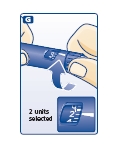
H. Hold your NovoLog® Mix 70/30 FlexPen® with the needle pointing up. Tap the cartridge gently with your finger a few times to make any air bubbles collect at the top of the cartridge (see diagram H).

I. Keep the needle pointing upwards, press the push-button all the way in (see diagram I). The dose selector returns to 0.
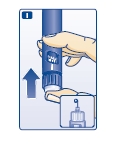
A drop of insulin should appear at the needle tip. If not, change the needle and repeat the procedure no more than 6 times.
If you do not see a drop of insulin after 6 times, do not use the NovoLog Mix® 70/30 FlexPen® and contact Novo Nordisk at 1-800-727-6500.
A small air bubble may remain at the needle tip, but it will not be injected.
SELECTING YOUR DOSE
Check and make sure that the dose selector is set at 0.
J. Turn the dose selector to the number of units you need to inject. The pointer should line up with your dose.
The dose can be corrected either up or down by turning the dose selector in either direction until the correct dose lines up with the pointer (see diagram J). When turning the dose selector, be careful not to press the push-button as insulin will come out.
You cannot select a dose larger than the number of units left in the cartridge.
You will hear a click for every single unit dialed. Do not set the dose by counting the number of clicks you hear.
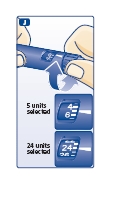
Δ Do not use the cartridge scale printed on the cartridge to measure your dose of insulin.GIVING THE INJECTION
Do the injection exactly as shown to you by your healthcare provider. Your healthcare provider should tell you if you need to pinch the skin before injecting. Wipe the skin with an alcohol swab and let the area dry.
K. Insert the needle into your skin.
Inject the dose by pressing the push-button all the way in until the 0 lines up with the pointer (see diagram K). Be careful only to push the button when injecting.
Turning the dose selector will not inject insulin.
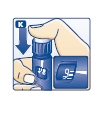
L. Keep the needle in the skin for at least 6 seconds, and keep the push-button pressed all the way in until the needle has been pulled out from the skin (see diagram L). This will make sure that the full dose has been given.

You may see a drop of NovoLog® Mix 70/30 at the needle tip. This is normal and has no effect on the dose you just received. If blood appears after you take the needle out of your skin, press the injection site lightly with an alcohol swab. Do not rub the area.
After the injection
Do not recap the needle. Recapping can lead to a needle stick injury. Remove the needle from the NovoLog® Mix 70/30 FlexPen® after each injection. This helps to prevent infection, leakage of insulin, and will help to make sure you inject the right dose of insulin.
Δ Put the needle and any empty NovoLog® Mix 70/30 FlexPen® or any used NovoLog® Mix 70/30 FlexPen® still containing insulin in a sharps container or some type of hard plastic or metal container with a screw top such as a detergent bottle or empty coffee can. These containers should be sealed and thrown away the right way. Check with your healthcare provider about the right way to throw away used syringes and needles. There may be local or state laws about how to throw away used needles and syringes. Do not throw away used needles and syringes in household trash or recycling bins.
The NovoLog® Mix 70/30 FlexPen® prevents the cartridge from being completely emptied. It is designed to deliver 300 units.
M. Put the pen cap on the NovoLog® Mix 70/30 FlexPen® and store the NovoLog® Mix 70/30 FlexPen® without the needle attached (see diagram M).
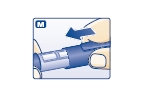
FUNCTION CHECK
N. If your NovoLog® Mix 70/30 FlexPen® is not working the right way, follow the steps below:
- Screw on a new NovoFine® needle.
- Remove the big outer needle cap and the inner needle cap.
- Do an airshot as described in "Giving the airshot before each injection".
- Put the big outer needle cap onto the needle. Do not put on the inner needle cap.
- Turn the dose selector so the dose indicator window shows 20 units.
- Hold the NovoLog® Mix 70/30 FlexPen® so the needle is pointing down.
- Press the push-button all the way in.
The insulin should fill the lower part of the big outer needle cap (see diagram N). If NovoLog® Mix 70/30 FlexPen® has released too much or too little insulin, do the function check again. If the same problem happens again, do not use your NovoLog® Mix 70/30 FlexPen® and contact Novo Nordisk at 1-800-727-6500.
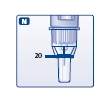
Maintenance
Your NovoLog® Mix 70/30 FlexPen® is designed to work accurately and safely. It must be handled with care. Avoid dropping your NovoLog® Mix 70/30 FlexPen® as it may damage it. If you are concerned that your NovoLog® Mix 70/30 FlexPen® is damaged, use a new one. You can clean the outside of your NovoLog® Mix 70/30 FlexPen® by wiping it with a damp cloth. Do not soak or wash your NovoLog® Mix 70/30 FlexPen® as it may damage it. Do not refill your NovoLog® Mix 70/30 FlexPen®.
Δ Remove the needle from the NovoLog® Mix 70/30 FlexPen® after each injection. This helps to ensure sterility, prevent leakage of insulin, and will help to make sure you inject the right dose of insulin for future injections.
Δ Be careful when handling used needles to avoid needle sticks and transfer of infectious diseases.
Δ Keep your NovoLog® Mix 70/30 FlexPen® and needles out of the reach of children.
Δ Use NovoLog® Mix 70/30 FlexPen® as directed to treat your diabetes. Needles and NovoLog® Mix 70/30 FlexPen® must not be shared.
Δ Always use a new needle for each injection.
Δ Novo Nordisk is not responsible for harm due to using this insulin pen with products not recommended by Novo Nordisk.
Δ As a precautionary measure, always carry a spare insulin delivery device in case your NovoLog® Mix 70/30 FlexPen® is lost or damaged.
Remember to keep the disposable NovoLog® Mix 70/30 FlexPen® with you. Do not leave it in a car or other location where it can get too hot or too cold.
Date of Issue: May 7, 2010
Version: 8
NovoLog® , FlexPen® , NovoFine® , are trademarks of Novo Nordisk A/S.
NovoLog® is covered by US Patent Nos. 5,547,930, 5,618,913, 5,834,422, 5,840,680, 5,866,538 and other patents pending.
FlexPen® is covered by US Patent Nos. 6,582,404, 6,004,297, 6,235,004 and other patents pending.
© 2002-2010 Novo Nordisk A/S
Manufactured by:
Novo Nordisk A/S
DK-2880 Bagsvaerd, Denmark
For information about NovoLog Mix 70/30® contact:
Novo Nordisk Inc.
100 College Road West,
Princeton, New Jersey 08540
-
PRINCIPAL DISPLAY PANEL
NovoLog® Mix 70/30
70% insulin aspart protamine
suspension and 30% insulin
aspart injection, (rDNA origin)
100 units/mL 10mL
NDC 54868-5201-0
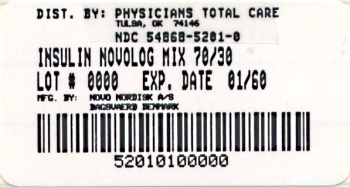
Shake carefully before using. See enclosed insert for proper technique.
Rx only
U-100
------------------------------------------------------------------------------------------------------------------------------------------
NovoLog® Mix 70/30
FlexPen® Prefilled Syringe
70% insulin aspart protamine, suspension and
30% insulin aspart injection, (rDNA origin)
100 units/mL (U-100)
5x3 mL Prefilled Insulin Syringes
NDC 54868-5327-1
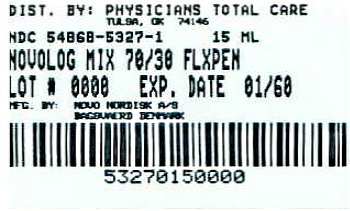
Rx only
Single patient use only
Shake carefully before using. See
enclosed insert for proper technique.
For use with NovoFine® disposable
needles.
Keep in a cold place.
Avoid freezing.
Protect from light.
-
INGREDIENTS AND APPEARANCE
NOVOLOG MIX 70/30
insulin aspart injection, suspensionProduct Information Product Type HUMAN PRESCRIPTION DRUG Item Code (Source) NDC:54868-5201(NDC:0169-3685) Route of Administration SUBCUTANEOUS Active Ingredient/Active Moiety Ingredient Name Basis of Strength Strength INSULIN ASPART (UNII: D933668QVX) (INSULIN ASPART - UNII:D933668QVX) INSULIN ASPART 100 [iU] in 1 mL Inactive Ingredients Ingredient Name Strength SODIUM PHOSPHATE, DIBASIC, DIHYDRATE (UNII: 94255I6E2T) 1.25 mg in 1 mL HYDROCHLORIC ACID (UNII: QTT17582CB) MANNITOL (UNII: 3OWL53L36A) 36.4 mg in 1 mL METACRESOL (UNII: GGO4Y809LO) 1.72 mg in 1 mL PHENOL (UNII: 339NCG44TV) 1.5 mg in 1 mL PROTAMINE SULFATE (UNII: 0DE9724IHC) 0.32 mg in 1 mL SODIUM CHLORIDE (UNII: 451W47IQ8X) 0.58 mg in 1 mL SODIUM HYDROXIDE (UNII: 55X04QC32I) ZINC (UNII: J41CSQ7QDS) 19.6 ug in 1 mL Packaging # Item Code Package Description Marketing Start Date Marketing End Date 1 NDC:54868-5201-0 1 in 1 CARTON 1 10 mL in 1 VIAL, GLASS Marketing Information Marketing Category Application Number or Monograph Citation Marketing Start Date Marketing End Date NDA NDA021172 12/28/2004 NOVOLOG MIX 70/30
insulin aspart injection, suspensionProduct Information Product Type HUMAN PRESCRIPTION DRUG Item Code (Source) NDC:54868-5327(NDC:0169-3696) Route of Administration SUBCUTANEOUS Active Ingredient/Active Moiety Ingredient Name Basis of Strength Strength INSULIN ASPART (UNII: D933668QVX) (INSULIN ASPART - UNII:D933668QVX) INSULIN ASPART 100 [iU] in 1 mL Inactive Ingredients Ingredient Name Strength SODIUM PHOSPHATE, DIBASIC, DIHYDRATE (UNII: 94255I6E2T) 1.25 mg in 1 mL GLYCERIN (UNII: PDC6A3C0OX) 16 mg in 1 mL HYDROCHLORIC ACID (UNII: QTT17582CB) METACRESOL (UNII: GGO4Y809LO) 1.72 mg in 1 mL PHENOL (UNII: 339NCG44TV) 1.5 mg in 1 mL PROTAMINE SULFATE (UNII: 0DE9724IHC) 0.32 mg in 1 mL SODIUM CHLORIDE (UNII: 451W47IQ8X) 0.877 mg in 1 mL SODIUM HYDROXIDE (UNII: 55X04QC32I) ZINC (UNII: J41CSQ7QDS) 19.6 ug in 1 mL Packaging # Item Code Package Description Marketing Start Date Marketing End Date 1 NDC:54868-5327-1 5 in 1 CARTON 1 3 mL in 1 SYRINGE, PLASTIC Marketing Information Marketing Category Application Number or Monograph Citation Marketing Start Date Marketing End Date NDA NDA021172 05/17/2011 Labeler - Physicians Total Care, Inc. (194123980) Establishment Name Address ID/FEI Business Operations Physicians Total Care, Inc. 194123980 relabel, repack

